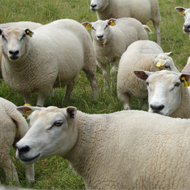Outbreaks of incurable sheep disease on the rise

MV causes increased mortality, reduced fertility and poor body condition.
Outbreaks of the incurable disease, Maedi Visna (MV), are rising, sheep farmers have been warned.
Scotland's Rural College (SRUC) says it fears many in the industry have an “out of sight, out of mind” attitude to the viral disease. It can lead to poor body condition, reduced fertility, smaller and weaker lambs, increased mastitis and mortality.
Statistics from veterinary laboratories show the number of outbreaks in Scotland, England and Wales are rising, according to SRUC's health schemes manager Ian Pritchard.
Specialists say a high level of infection has been seen in some flocks. In one recently tested flock, 11 out of 12 ewes tested positive for MV, while in another flock, 41 out of 48 sheep were infected.
MV is caused by a retrovirus that was introduced into the UK through imported animals. Contagious and difficult to diagnose, the disease has since spread, particularly in commercial flocks.
Mr Pritchard says sheep farmers “cannot afford to be complacent and underestimate the risks of the disease.”
He gave the example of one flock with “8 per cent ewe mortality, a high cull rate due to mastitis and poor condition resulting in a high net replacement cost and lambs often with poorer growth rates.”
Another large flock estimated the financial cost on MV to be between £30,000 and £50,000, due to a 20 to 40 per cent reduction in flock productivity, predominantly due to MV.
Sheep farmers are being warned to ensure boundary fences are secure to avoid contact with other flocks. SRUC also recommends all new sheep brought onto farms should be quarantined and tested, or bought from MV accredited flocks.
The MV accreditation scheme is run by Premium Sheep and Goat Health Scheme. It has over 2,600 members who are required to test their sheep regularly for MV.



 The latest
The latest